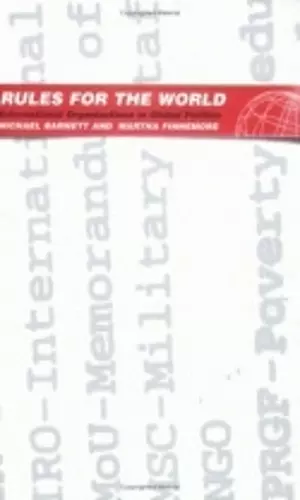Rules for the World
International Organizations in Global Politics
Michael Barnett author Martha Finnemore author
Format:Hardback
Publisher:Cornell University Press
Published:12th Oct '04
Currently unavailable, and unfortunately no date known when it will be back
This hardback is available in another edition too:
- Paperback£21.99(9780801488238)

Rules for the World provides an innovative perspective on the behavior of international organizations and their effects on global politics. Arguing against the conventional wisdom that these bodies are little more than instruments of states, Michael Barnett and Martha Finnemore begin with the fundamental insight that international organizations are bureaucracies that have authority to make rules and so exercise power. At the same time, Barnett and Finnemore maintain, such bureaucracies can become obsessed with their own rules, producing unresponsive, inefficient, and self-defeating outcomes. Authority thus gives international organizations autonomy and allows them to evolve and expand in ways unintended by their creators.
Barnett and Finnemore reinterpret three areas of activity that have prompted extensive policy debate: the use of expertise by the IMF to expand its intrusion into national economies; the redefinition of the category "refugees" and decision to repatriate by the United Nations High Commissioner for Refugees; and the UN Secretariat's failure to recommend an intervention during the first weeks of the Rwandan genocide. By providing theoretical foundations for treating these organizations as autonomous actors in their own right, Rules for the World contributes greatly to our understanding of global politics and global governance.
International organizations are a growing presence in the global system but remain a neglected subject of study. This book by two prominent political scientists provides a groundbreaking look at their impact, making clear that international organizations may be created by powerful states but, once established, are neither straightforward tools of states nor unalloyed servants of a global common good.... Barnett and Finnemore conclude that the impact of these organizations lies less in the expert knowledge they wield than in the ways they define problems, set agendas, and deploy 'intellectual technologies.' The most intriguing insights of the book, however, emerge as the authors grapple with what the growing 'global bureaucratization' means for democratic accountability.
-- G. John Ikenberry * Foreign Affairs *The authors take a novel approach to studying international organizations and establish a framework wherein these actors have the potential to develop preferences and cultures that are counter to the wishes of their member states. The authors breathe new life into the study of IGOs by removing the rose-colored glasses of the extant literature, which cannot account for negative and independent behaviors of these organizations.
-- C. S. Leskiw * ChoiISBN: 9780801440908
Dimensions: 235mm x 155mm x 24mm
Weight: 907g
240 pages